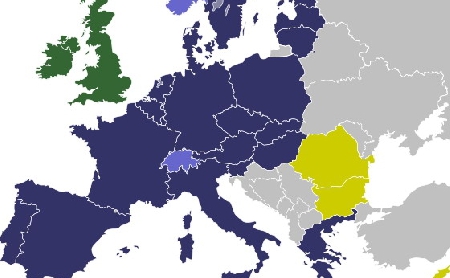Schengen, an area too far to reach
After Romania became a member of The European Union in 2007, joining the Schengen area became the top priority for Bucharests foreign policy.
Warning: Trying to access array offset on null in /home/web/rri.ro/public/wp-content/themes/rri/template-parts/content.php on line 53

Warning: Trying to access array offset on null in /home/web/rri.ro/public/wp-content/themes/rri/template-parts/content.php on line 98
România Internațional,
18.10.2013, 13:26
After Romania became a member of the European Union in 2007, joining the Schengen area became the top priority for Bucharest’s foreign policy. Expected to occur in March, 2011, accession proved too far, as the EU’s Justice and Home Affairs Council repeatedly delayed, under various pretexts, debating the issue of clear deadlines for including Romania and Bulgaria in free movement area. It seems that Schengen is a very hard aim to reach. Foreign policy analyst Bogdan Chirieac tries to explain:
‘There is no logical explanation. Something just happened, not in Romania, but in Europe. We are talking about western, democratic, rich Europe, which broke its promise to Romania. The Schengen agreement reads nothing about the Cooperation and Verification Mechanism, the justice system, the Rroma minority, and other such things. That was supposed to be a simple technical issue of securing borders. Romania spent one billion Euros to secure the border, employing a famous French-German company.’
Ironically, Germany and France, alongside Holland, are right now the most reticent towards Romania’s and Bulgaria’s accession. This very month, the German home secretary, Hans-Peter Fridrich, accused Romania and Bulgaria of improperly dealing with the social integration of the Rroma, which, in his opinion, puts great migration pressure on certain countries, mostly Germany. He took this stance after a German court ruled that a family of Romanian migrants has a right to receive social assistance. If the ruling stands permanently, it will definitely increase migration to Germany, the secretary believes, emphasizing the fact that Brussels has to make sure that Romania and Bulgaria make good use of European funds for social integration.
In reply, the Romanian home secretary reiterated the fact that Romania meets all the technical and legal criteria for joining Schengen, and that a decision on this matter should not be pending on the Rroma issue. The same issue was discussed in Paris. The members of the French cabinet talked about the allegedly insufficient efforts made by the authorities in Bucharest to integrate the Rroma, even though their initial objections involved securing the borders of Romania and Bulgaria. Here is Bogdan Chirieac once again:
‘The Rroma minority in France has nothing to do with Schengen. The Rroma go there anyway, they are European citizens, they cannot be halted at the border, even if they don’t have documents, meaning an ID card. This is an aberration. The crisis has sparked in Europe a kind of madness, I would dare say that it is comparable to the Great Depression of 1929-1930.’
Pilippe Gustin, the French ambassador to Bucharest, said that one should not confuse two different issues:
‘The Schengen issue is a technical problem that has turned political, it has to do with Romania’s home policy and the home policy of all EU member countries. We should not confuse two different things. Unfortunately, this confusion has been sustained for years, and the media has joined in.’
Even though all Schengen states have admitted that Romania and Bulgaria have met the technical criteria, Bucharest and Sofia now must wait for the report issued as part of the Cooperation and Verification Mechanism, demanded by those countries that tie accession to the conclusions of this document. The report, reflecting progress in justice, will only be submitted early next year, as announced by mark Gray, spokesman for the European Commission. Meanwhile, Romania and Bulgaria have announced they would continue lobbying Europe for a decision in favor of their joining Schengen, in full compliance with European principles and regulations.





























